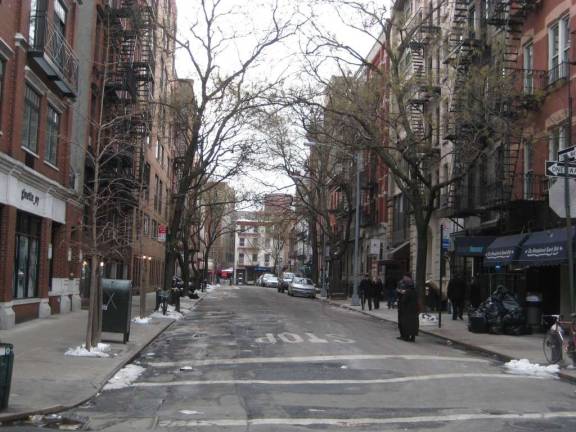In Defense of Change

Why New Yorkers should embrace change
By Kristine Keller
The time has come. After four years of living in the same home, my home, I'm leaving. I don't know where to just yet, maybe across the river, maybe across the bridge, maybe just across the block, but I do know I'm leaving. And for some time, this has inevitability frightened me. What's going to happen to my neighbors, and grocers, and the flower guy on Prince Street? The familiarity of it all has been my safe box amidst the chaos of NYC.
Change can come swiftly at the other end of a phone call or it can creep up on us slowly, only noticed in magnified mirrors. Sometimes change is thrust upon us and sometimes we seek it out. In this case, I'm the seeker. And I'm seeking it because I've realized that change is good; hell, it's even healthy.
For so long I've lived on the precipice of fear, afraid to jump, fearing that my world would turn on itself. But after taking baby steps as minor as changing my pizza place of choice from Rubirosa on Mulberry to Emporio on Mott, something has happened. My thoughts have more clarity, my creative wheelhouse has been spinning faster than ever, and I can say I've felt happier. Those small steps have even dovetailed into monumental changes. I've changed jobs, made time for friends I never see, started dating people completely different than those I've deemed my "type," and started walking new routes and uncovering unknown streets beneath my feet.
And all of these positive changes make sense given the brain's intricately formed architecture, which includes a built-in novelty detector. Our brains need novelty and challenges like we need food. In fact, romantic researches implore couples to constantly interweave novelty into relationships since boredom is deemed one reason couples grow unhappy with each other. We're hardwired to crave and grow from change, which means we may be stifling our brain's capacity to burgeon by living an inveterate life of the same food and same Friday nights out. Our frontal lobes, the part of the brain responsible for decision-making, planning, and problem solving, don't fully mature until our 20s and 30s which also makes nurturing that area of growth essential for development.
Change is also what precipitates inspiration. Geniuses like Mozart and Einstein weren't afraid of change and went against the grain in pursuit of new ideas and discoveries. We can't develop new technology, write the treaty that will find peace in the Middle East, or cure chronic illnesses when we're comfortable. We also can't form new memories when we don't change. And what a shame to live in the greatest city in the world and not be able to remember the night your heart skipped a beat when you found love in a hopeless bar on Spring Street or the winter mornings you spent running along the Hudson, feeling the icy breath of the river on your face. Those were different times, different seasons, different years, deserving of distinct time stamps.
So, how do you make the deep dive and start changing? Start at the shallow end and commit to one small change per week. If you run the same path every morning through Washington Square Park, change it. Shop at a different grocery store, volunteer at a different children's school, change the subway car you ride in every morning. Though I'm shaking my safety box by moving from the apartment I've known for years, I'm not afraid anymore. I'll find a new flower guy, a different pizza parlor, and when ideas and creativity begin flooding as a result, I'll get to work on that peace treaty.
Kristine Keller received her masters in Psychology from New York University. E-mail her at StreetshrinkNYC@Gmail.com for questions.